In 2016, I compiled a list of books I’m anticipating by women writers of color because, as a reader, writer, and occasional critic, I couldn’t find many such titles. If I was having trouble, I thought, then others surely were, too. Perhaps they’d also find the list useful. The first list was one of Electric Literature’s most-shared pieces of 2016. To my joy and surprise, I heard the piece was helping inform other publications’ books coverage, educators’ syllabi, and book-prize considerations.
Finding these books has become, in the last seven years, less difficult, and I continue to hope that American letters will become so inclusive this effort will become obsolete. But we’re still far from that point. I’ll keep hoping.
In the meantime, these are some of the 2023 books that I, personally, am anticipating. It’s one list, inevitably incomplete; I know I’m missing wonderful titles. If you see a book missing and want to support it, please consider preordering it from your local independent bookstore, requesting it from the library, talking about it to others, or all of the above. This piece is also front-loaded toward the earlier part of the year, as there isn’t as much information yet about titles publishing in the fall and afterward. And though I love and need poetry, as a novelist and essayist I’m less aware of what’s forthcoming in poetry, so here I address only books of prose.
Notes on methodology: the term “of color” is a flawed label with ever-shifting nuances, valences, and interpretations. In the past, I’d expanded this list to nonbinary writers; Electric Literature and I then heard from some nonbinary writers that it can be preferable to avoid grouping nonbinary people with women. Accordingly, in recent years, I’ve limited this list to books by women: cis women and trans women, as well as nonbinary women who assented to having their work included in this space. An overwhelming majority of the nonbinary writers and readers we’ve heard from have continued to find this preferable. That said, when it comes to communities that are not mine, I’m strongly on the side of following the lead of people in those communities. If you feel differently, please let us know. In the meantime, Electric Literature has also published a piece about anticipated books by LGBTQ+ writers.
Included below are several books from HarperCollins, one of the big five publishers that collectively issue most of the books sold in America. The HarperCollins Union has been on strike since November 10, 2022 to get a fair contract for their workers. You can learn more here about how to support their fight for a fair contract.
Please join me in rejoicing over these upcoming books.
January
Black Women Writers at Work edited by Claudia Tate
Three cheers for this new edition of an out-of-print collection of Tate interviewing Gwendolyn Brooks, Nikki Giovanni, Gayl Jones, Audre Lorde, Toni Morrison and other foundational Black women writers about their work and lives. I have a deteriorating, used copy that has stayed on my bedside table for years, and am thrilled about this reissue. Angela Y. Davis says that “Black Women Writers at Work serves as a much-needed reminder that the imagination always blazes trails that lead us toward more habitable futures.”
Shubeik Lubeik by Deena Mohamed
A debut graphic novel about a fantastical alternate Cairo where wishes are sold. Involving angels, monsters, and decades of history, Shubeik Lubeik has received the Best Graphic Novel and the Grand Prize at the Cairo Comix Festival. Mattie Lubchansky says “Mohamed builds a rich and harrowing world—and finds every place a fascinating story might be hiding.”
The Faraway World by Patricia Engel
From the New York Times-bestselling Engel, here comes a collection of short stories that include characters such as a woman in Cuba who’s discovered that her brother’s bones are stolen, a couple hustling in Miami, and Colombian strangers meeting in New York. I’ve long maintained that I want to read anything Engel writes; I’m sure The Faraway World collection will further confirm this desire.
Night Wherever We Go by Tracey Rose Peyton
Peyton’s debut novel is about six enslaved women in Texas who stage a rebellion against their owners. Kiese Laymon says that “Night Wherever We Go has the potential to change how Blacknesses, Texas and the nation are written about forever.”
The Survivalists by Kashana Cauley
In this doomsday novel, a driven lawyer falls for a coffee entrepreneur who lives with a group of doomsday preppers. Deesha Philyaw says it’s “delicious, deeply satisfying,” and Jade Chang calls it “funny and deliciously unexpected—the perfect companion for our chaotic times.”
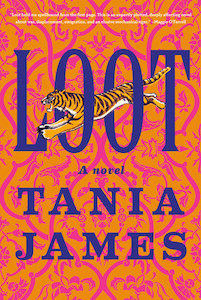
Loot by Tania James
I’ve eagerly followed James’s writing for years, and this new novel brings to life an eighteenth-century wood-carver recruited to build a gigantic tiger automaton for the ruler of Mysore. Megha Majumdar calls it “a feast—a hugely fun novel with a delicious plot that offers delights and profundities in equal measure,” offering “stunning truths about circumstance and ambition, love and sacrifice, and the fickleness of victory.”
Moonrise Over New Jessup by Jamila Minnicks
Minnicks’ first novel, winner of the PEN/Bellwether Prize for Socially Engaged Fiction, is about a woman named Alice Young who moves to the all-Black town of New Jessup, Alabama. She falls in love with an organizer engaged in work that could risk their ability to stay in New Jessup. “An immersive and timely recasting of history by a gloriously talented writer to watch,” says Margaret Wilkerson Sexton.
Brotherless Night by V.V. Ganeshananthan
I’ve been haunted by Ganeshananthan’s fiction since I first encountered it in an issue of Ploughshares a decade ago, and can’t wait to read this novel about a woman who is a field-hospital medic for the militant Tamil Tigers. She’s eventually recruited to join a project documenting human-rights violations. “A beautiful, brilliant book—it gives an accounting of the unimaginable losses suffered by a family and by a country, but it is as tender and fierce as it is mournful,” says Danielle Evans.
Maame by Jessica George
Spending her time in London as a primary caretaker for her father and as the only Black person in every meeting at her job, Maddie Wright wishes to lead a less constricted life. Celeste Ng calls this debut novel “an utterly charming and deeply moving portrait of the joys––and the guilt––of trying to find your own way in life.”
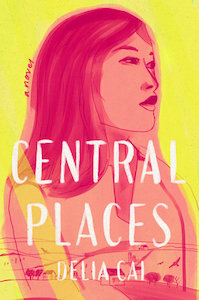
Central Places by Delia Cai
Cai is a senior correspondent at Vanity Fair and the creator of a beloved media newsletter, Deez Nuts. In her first novel, a Chinese American woman from Illinois brings her white fiancé home to meet her parents. I read an advance copy of Central Places months ago, and have not begun to forget its luminous depiction of the complications of relationships with friends, old and new romantic loves, and immigrant parents.
Bad Cree by Jessica Johns
A horror-inflected debut about a woman named Mackenzie who wakes up one day with a severed crow’s head in her hands. A murder of crows is stalking Mackenzie, who is grieving her sister’s death. A novel spun from alarming crows, complicated grief, and eerie dreams: yes, yes, and yes. According to Kristen Arnette, Johns “writes the world in all its messiness and terror, while simultaneously remembering to center its tender beating heart.”
Black and Female by Tsitsi Dangarembga
Dangarembga is a writer, filmmaker, and playwright whose novels have received the Commonwealth Writers Prize and been shortlisted for the Booker Prize. Black and Female, an essay collection, “blazes with her characteristic intellectual prowess, unstinting honesty, and commitment to personal and political acts of resistance and reclamation,” says Nadia Owusu.
February
Dyscalculia by Camonghne Felix
Felix, a splendid poet and essayist whose debut poetry collection was longlisted for the National Book Award, is now publishing a first book of prose reflecting on mental health, trauma, hospitalization, and her relationship to mathematics. Raven Leilani calls it “a frank exploration of pleasure, heartbreak, and reclamation” that “rejects containment and asks instead for care.”
Hijab Butch Blues by Lamya H
In a memoir-in-essays from a former Lambda Literary Fellow, a queer, devout Muslim immigrant juxtaposes their coming-of-age and young adulthood with stories from the Quran. I’ve greatly admired her short-form writing, and Kai Cheng Thom says the book is “sure to become a queer classic.”
A Spell of Good Things by Ayọ̀bámi Adébáyọ̀
Adébáyọ̀’s debut book. Stay With Me, was shortlisted for the Baileys Prize for Women’s Fiction, and her follow-up intertwines the stories of two Nigerian families described as being “caught in the riptides of wealth, power, romantic obsession, and political corruption.”
When Trying to Return Home by Jennifer Maritza McCauley
This collection of short stories covers a century of the lives of fictional Black Americans and Afro-Puerto Ricans, ranging from a woman trying to rescue her brother to a college student facing off with a nun. De’Shawn Charles Winslow says the book features a “cast of some of the most memorable characters and predicaments” he’s encountered in fiction.
My Nemesis by Charmaine Craig
Craig’s previous novel, Miss Burma, was longlisted for the National Book Award and the Women’s Prize for Fiction. In her new novel, a writer named Tessa clashes with Wah, the wife of a philosopher-scholar friend, going so far as to call the latter “an insult to womankind.” According to Sarah Shun-lien Bynum, “My Nemesis is an exhilarating act of defiance, a novel that lights a match and sends the whole question of female characters’ likability up in flames.” As someone who very badly wants the notion of women characters’ likability to go up in flames, I say hallelujah.
Our Share of Night by Mariana Enriquez, translated by Megan McDowell
“Reader, beware! Our Share of Night is a novel so disquieting, so unsettling that I could neither put it down nor read it late at night,” says Kelly Link. This new book from the International Booker Prize-shortlisted Enriquez is about a grieving father and son who get involved with a terrifying cult in search of immortality.
An Autobiography of Skin by Lakiesha Carr
Carr’s debut novel, which incorporates back-room parlor slots, postpartum depression, and spiritual combat, follows generations of women in the South. “Meditative and powerful in its love for the generations of Black women at its heart, An Autobiography of Skin dives body-and-soul into its characters’ experiences to explore questions about faith, forgiveness, and the fortitude that just living day to day can sometimes require,” says Dawnie Walton.
March
Ada’s Room by Sharon Dodua Otoo, translated by Jon Cho-Polizzi
Reading an advance copy of this highly inventive, unpredictable first novel from the Ingeborg Bachmann Prize-winning writer and activist Otoo, I was astonished by a narrative that jumps back and forth across 400 years and the experiences of four women named Ada trying to survive in West Africa, Victorian England, and Germany. I haven’t quite come across anything like this before.
Saving Time by Jenny Odell
It can seem that almost everyone I know is emotionally and physically exhausted, barely getting through the ever-alarming days. (I, too, am an everyone.) In this new book from the rigorously original Odell, she explores how we experience time, reimagining the clock-based, profit-driven world in which most of us live and continue to burn out. Ed Yong calls it one of the most important books he’s read in his life.
What Happened to Ruthy Ramirez by Claire Jiménez
A Puerto Rican family on Staten Island learns that a lost sister might have been cast on a reality TV show, and they set off to bring her home. According to Jaquira Díaz, Jimenze’s first novel is “hilarious and heartbreaking,” and Jiménez “is both storyteller and cultural critic, giving us an unflinching rejection of respectability politics.”
Sea Change by Gina Chung
A relatively specific but ferocious opinion of mine is that there simply isn’t enough fiction starring jellyfish, octopodes, giant squid, and their flexible ilk. In Sea Change, which Mira Jacob calls “a wild blessing of a debut,” a woman who works at a mall aquarium befriends a giant Pacific octopus named Dolores. When the woman is tossed overboard, she has to find her way back to shore with the octopus’s help.
The Human Origins of Beatrice Porter and Other Essential Ghosts by Soraya Palmer
Zora and Sasha Porter, sisters living in Brooklyn, are confronted with a buried family secret. Angela Mi Young Hur says the novel is peopled by “Anansi and other folkloric figures and deities of their Jamaican Trinidadian heritage” that transform “from teller to teller, from one generation to the next—at times haunting or healing, seductive or terrifying.”
Who Gets Believed? by Dina Nayeri
In what Robert Macfarlane calls “an interrogation of ‘disbelief culture’ and the injustice that both fuels it and is fueled by it, a form-shifting memoir of an already-remarkable life, and a moving, harrowing investigation of love, loss and care,” Nayeri reflects on who gets believed and who doesn’t, in contexts from asylum interviews to emergency rooms to corporate offices.
The Great Reclamation by Rachel Heng
Ah Boon, a child in a fishing village in twentieth-century Singapore, discovers a magical ability to find movable islands. The Japanese army invades, and the future of his village is in jeopardy. Heng’s debut novel was fascinating, and according to Julie Otsuka, “The Great Reclamation is both an intimate love story and an epic historical tale that is sure to be read for years to come.”
April
Ordinary Notes by Christina Sharpe
Ordinary Notes is a book comprised of 248 notes about language, the past, art, photography, beauty, and Sharpe’s mother, Ida Wright Sharpe. Alexander Chee says that “Ordinary Notes is like an intellectual ice climb―you move along a careful series of handholds to cross a terrain that might otherwise seem impassable, and afterward, you are amazed at the passage. At once an act of careful attention and a juxtaposition of observations and questions, the result is a powerful vision of American life, drawn from the Black intellectual history and aesthetics that Sharpe has cultivated as the means to her own liberation, so that she might offer it to others.”
A Living Remedy by Nicole Chung
I wept while reading this devastating, radiant memoir, which Bryan Washington calls a “bouquet of feeling” and “a groundbreaking narrative steeped in love, humor, the infinitude of memory, and the essentiality of community.” A Living Remedy is about illness, family, and the terrible losses brought on and exacerbated by financial precarity, this country’s malfunctioning healthcare system, and the ravages of the pandemic.
The Haunting of Alejandra by V. Castro
A woman named Alejandra is haunted by ghostly visions of a crying woman in a white gown, the Mexican folk demon La Llorona. As Alejandra visits a therapist, she starts learning that La Llorona connects her to her mother, grandmother, and other women ancestors, and that she’ll need her foremothers’ help to banish the ghost. According to Lupita Aquino, this novel is provocative, haunting, and packed with secrets.
Blue Hour by Tiffany Clarke Harrison
Blue Hour is a fragmentary debut novel about a biracial photographer grieving a miscarriage whose student, a boy named Noah, is victimized by police brutality. As she visits Noah in the hospital, she learns she’s pregnant again. “A short, beautiful, intensely present work of art,” says Lydia Kiesling.
The Skin and Its Girl by Sarah Cypher
In a hospital in the Pacific Northwest, a baby’s skin turns cobalt blue, which the family matriarch believes to be the embodiment of her family’s sacred history as prominent soap-makers. According to Laura van den Berg, Betty Rummani, “born with cobalt-blue skin, into a family rich with ingenuity and secrets,” is “one of the most memorable and original protagonists” she’s come across in a long time.
May
Quietly Hostile by Samantha Irby
The wildly hilarious Irby has written a new collection of essays about Hollywood, QVC, bathroom etiquette, and Carrie Bradshaw. Jia Tolentino calls Irby’s writing “stay-up-all-night, miss-your-subway-stop, spit-out-your-beverage funny, as irresistible as a snack tray, as intimately pleasurable as an Irish goodbye.”
Let This Radicalize You by Kelly Hayes and Mariame Kaba
Organizers and movement educators Hayes and Kaba continue their influential, revolutionary work with this new co-authored book, intended to be a “a practical and imaginative resource for activists and organizers building power in an era of destabilization and catastrophe.” The book examines questions of mass protest, mutual aid, care, and defense, and includes insights from other experienced organizers.
In Vitro by Isabel Zapata, translated by Robin Myers
Drawing from diary and essay forms, In Vitro is a meditation on pregnancy, motherhood, in vitro fertilization, and pregnancy. Zapata “writes with a fluidity that can only come from wisdom,” according to Alejandro Zambra. “Sometimes it feels like we’re listening to her speak more than reading her on the page; it even feels like we can speak back.”
Yellowface by R.F. Kuang
A writer passes off a dead writer friend’s manuscript as her own, a theft made all the more diabolical by the fact that the thieving writer is white, the dead friend is Asian, and the white writer takes on a new name, Juniper Song. My blood is rising already. This novel from the New York Times-bestselling writer of the Poppy War trilogy, nominated for the Hugo and Nebula Awards, promises to be a wild ride of a book.
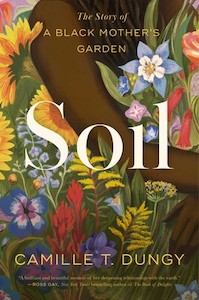
Soil by Camille T. Dungy
In this new book from the remarkable poet and scholar Dungy, she describes a seven-year endeavor to diversify her garden in a predominantly white Colorado community that restricted what residents could and couldn’t plant in their gardens. “I felt transformed by this graceful and generous book,” says Jami Attenberg.
Horse Barbie by Geena Rocero
Rocero, a former pageant queen from the Philippines, hid her trans identity after moving to the US, and, within a few years, became an in-demand model. In time, she was increasingly pulled toward openly being her authentic self. Rocero’s memoir is described as “a radiant testimony from an icon who sits at the center of transgender history and activism,” and a story “of survival, love, and pure joy.”
Notes on Her Color by Jennifer Neal
In this debut novel, a young Black and Indigenous woman named Gabrielle learns to change the color of her skin. Her mother, who also has this ability, tells her to present as white to avoid upsetting her father, and their whole house, including the food and spices, has been bleached white. Gene Kwak says, “Read this book. Come find me and we can bond over our shared joy. Weep over what we thought we feared.”
Human Sacrifices by María Fernanda Ampuero, translated by Frances Riddle
An undocumented woman answering a job posting that leads to danger, boys drowned while surfing, and a couple trapped in a terrifying maze: this gothic story collection has been praised by Mónica Ojeda as a magnificent book, writing that is “pure horror and aesthetic joy.”
An Autobiography by Angela Y. Davis
First published by Toni Morrison in 1974, this new edition of An Autobiography covers the legendary Davis’s journey from childhood to her work with the U.S. Communist Party, the Black Panther Party, and the Soledad Brothers, to teaching at UCLA, to the FBI’s list of the Ten Most Wanted Fugitives. “Still a key work in the areas of prison abolition and feminism, this reissue of a classic autobiography deserves a place of honor in any collection,” says Library Journal.
June
Holding Pattern by Jenny Xie
I’ve followed Xie’s captivating writing for a while, and, this summer, she’ll published a novel about a graduate-school dropout who moves back to her childhood house in Oakland. Her mother, it turns out, is in love with and getting married to a tech entrepreneur, and the daughter helps plan the wedding while finding a new job at a mysterious start-up.
Birdgirl by Mya-Rose Craig
Birder, environmentalist, and diversity and climate activist Craig has written a book that is partly a memoir, partly a bird-watching guide, and partly an account of how birding brought her family solace during her mother’s mental-health crisis. David Barrett says Birdgirl is “an essential read for a new generation of birders and environmentalists.”
Deep as the Sky, Red as the Sea by Rita Chang-Eppig
A suspenseful historical novel about a cutthroat pirate queen who, when her husband was killed by a Portuguese sailor, seized power to survive. Kirstin Chen calls Deep as the Sky, Red as the Sea “a riveting, heart-pounding exploration of ambition.” Y’all had me at the words “pirate queen.”
Rivermouth by Alejandra Oliva
Oliva is a translator and immigrant justice activist, and Rivermouth chronicles her experiences of interpreting at the U.S.-Mexico border and working on asylum cases. The book has been awarded the Whiting Creative Nonfiction Grant, which describes Rivermouth as being “subtle, personal, and deeply informative” from a writer whose “candid, intimate voice is irresistible.”
July
Owner of a Lonely Heart by Beth Nguyen
I rush to read Beth Nguyen’s writing. At the end of the Vietnam War, when eight-month-old Nguyen and her family fled Saigon, they were separated from her mother, whom Nguyen didn’t meet again until she was nineteen. “Nguyen’s triumph of a book is forged and fed by her searing curiosity about her refugee family’s past and her jeweler’s eye for precise detail—all while navigating the geography of her Midwest roots with a big, beautiful heart. A must-read for all who struggle with or celebrate complicated family,” says Aimee Nezhukumatathil.
8 Lives of a Century-Old Trickster by Mirinae Lee
This genre-bending novel, set in the demilitarized zone dividing North and South Korea, is about a shapeshifting trickster who is a spy, lover, mother, terrorist, murderer, and escape artist. 8 Lives of a Century-Old Trickster is recommended to admirers of Min Jin Lee’s Pachinko.
August
Family Lore by Elizabeth Acevedo
Family Lore is National Book Award–winning Acevedo’s first novel for adults, about a woman who can predict, to the day, when people will die. She gathers and family together for a living wake for herself. “Make room on your shelves, readers, for this strong new voice with an old soul and a deep well of understanding of who we wonderfully are for the brief time we are beings,” says Julia Alvarez.
Forgive Me Not by Jennifer Baker
Baker, the formidable Publishers Weekly Star Watch “Superstar” and host of the Minorities in Publishing podcast, has written a book about a an incarcerated teenager whose drunk-driving accident caused the death of her sibling. In this alternate world, the fate of juvenile offenders is decided by their victims and survivors, and Forgive Me Not is centered on the teenager’s quest for forgiveness from her family, as well as the costs of that quest. (Jennifer Baker is a former contributing editor to Electric Literature.)
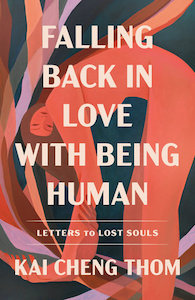
Falling Back in Love With Being Human by Kai Cheng Thom
I first came to Thom’s work through her excellent advice column, Ask Kai: Advice for the Apocalypse. In Falling Back in Love With Being Human, this writer, performance artist, and community healer writes through a crisis of faith. The book is described both as a collection of love letters and as a blueprint for falling back in love with being human.
Daughters of Latin America by edited Sandra Guzman
Daughters of Latin America is a collection of writing from 140 Latine writers, scholars, and activists including Elizabeth Acevedo, Julia Alvarez, Carmen Bouollosa, Berta Caceres, Naima Coster, Angie Cruz, Reyna Grande, Ada Limón, Achy Obejas, Ingrid Rojas Contreras, Cecilia Vicuña, and more. The book includes winners of the Grammy, National Book Award, Cervantes, and Pulitzer Prizes, a Nobel Laureate, and several writers being translated into English for the first time.
Every Drop Is a Man’s Nightmare by Megan Kakimoto
This debut story collection follows a cast of mixed native Hawaiian and Japanese women. Kakimoto, says Elizabeth McCracken, “gives us her Hawai’i, as bright as blood, as dark as blood: full of muscle and bone, sex, the body, corpse flowers, Night Marchers, the occasional Elvis impersonator,” in a book that “does not pull its punches; it’s altogether a knockout.”
Lush Lives by J. Vanessa Lyon
Lush Lives is one of the first books from Roxane Gay’s new imprint at Grove Atlantic, and it’s a love story about Glory Hopkins, an artist struggling to find gallery representation. Glory, after inheriting a house that contains a rare manuscript, works with an auction house appraiser to learn more about the mysterious manuscript. Lush Lives is described as “an unforgettable novel of queer love, ambition, and the forgotten histories that define us.”
The End of August by Yu Miri, translated Morgan Giles
Yu is a Zainichi Korean playwright, novelist, and essayist who received the National Book Award for her unforgettable, eerie novel Tokyo Ueno Station. In this multigenerational epic, a marathon runner summons shamans to connect with the ghost of an ancestor who was a contender for the Olympics in occupied Korea.
September & later
I Believe in Our Power by Raquel Willis
Willis is an activist, writer, and media strategist who has worked as a national organizer for the Transgender Law Center and the executive editor of Out magazine. I’ve followed her exceptional work for a while, and her debut memoir is about her coming of identity and activism.
This is Salvaged by Vauhini Vara
Vara’s The Immortal King Rao, a show-stopping novel about a Dalit immigrant who becomes extremely powerful, and about his child, was one of my favorite books that published in 2022, and this story collection promises to be at least as good. I first read a story from this collection, “I, Buffalo,” a decade ago in Tin House. It’s a heartbreaking, somehow very funny story about alcoholism, buffalos, and metamorphosis, one I must have reread a dozen times.
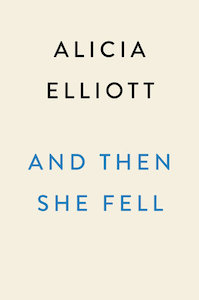
And Then She Fell by Alicia Elliott
Elliott’s bestselling debut book, A Mind Spread Out on the Ground, hasn’t left me since I read it in 2020, and her second novel is about a new mother struggling to write a modern retelling of the Haudenosaunee creation story. A fictional portrayal of motherhood, mental health, threatening neighbors, surface charm, and denial, And Then She Fell is described as being poignant, raw, funny, and urgent.
The Liberators by E.J. Koh
Poet, translator, and writer Koh’s incandescent memoir, The Magical Language of Others, had me crying and crying, and her debut novel, The Liberators, spans four generations of a family haunted by decisions made in times of war, migration, and dictatorship.
You Get What You Pay For by Morgan Parker
The dazzling poet Parker is publishing a collection of essays connected by Parker’s years-long attempt at “trying to square the resonance of her writing with the alienation that accompanies being forever single,” a question that takes Parker through American cultural history as she combines criticism with personal anecdotes.
Evil Eye by Etaf Rum
After having been raised by a conservative Palestinian family in Brooklyn, Yara thinks she’ll free herself by marrying an entrepreneur and moving. But dissatisfaction follows, then trouble, and a curse from the past might be to blame. From the New York Times-bestselling writer of A Woman is No Man.
Magical / Realism by Vanessa Angélica Villarreal
I’m a longtime fan of Villarreal’s superb writing, and her next book is a collection of essays about grief tangled with pop culture, as well as the complicated girlhoods of being a working-class daughter of a cumbia musician. Here’s betting the collection will be outstanding.
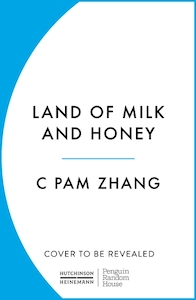
Land of Milk and Honey by C Pam Zhang
Land of Milk and Honey, a new novel from the Booker Prize-nominated Zhang, is about a chef who ends up in a decadent colony of the extremely rich, taking place in an all too plausible future in which food is vanishing. I had the luck of reading a draft of this novel, and can tell you it is marvelous and terrifying and will make you very, very hungry.
What if We Get it Right by Ayana Johnson
Johnson, a marine biologist, policy expert, and writer, has written a book proposing that we ask, “What would it look like if we actually solved climate change?” Such is my emotional landscape these days that even reading that question makes me tear up. I know I’m far from alone, and What if We Get it Right is a call to action and a “vision of the new climate future we can create through community and creative problem-solving.”
